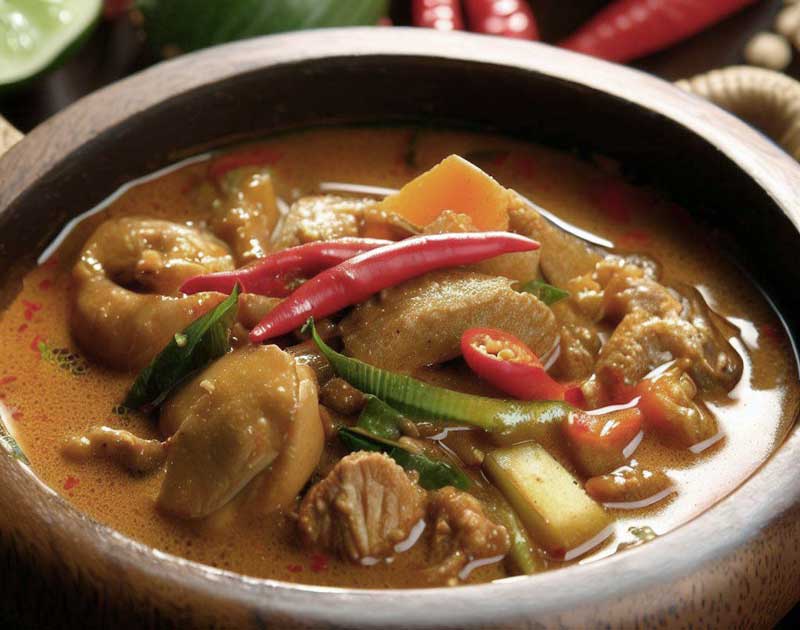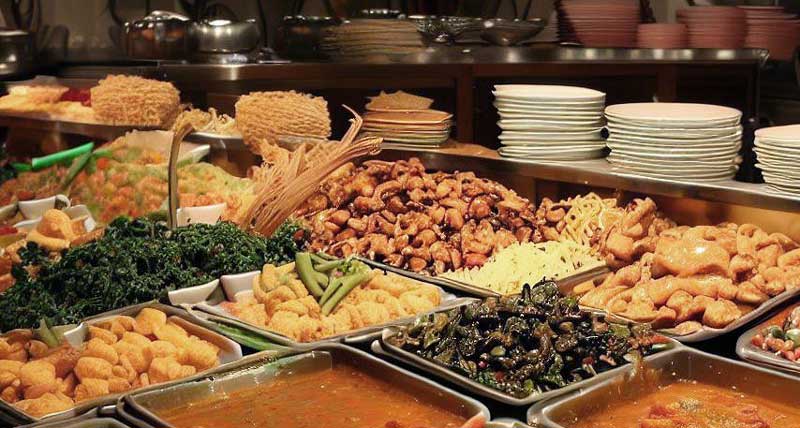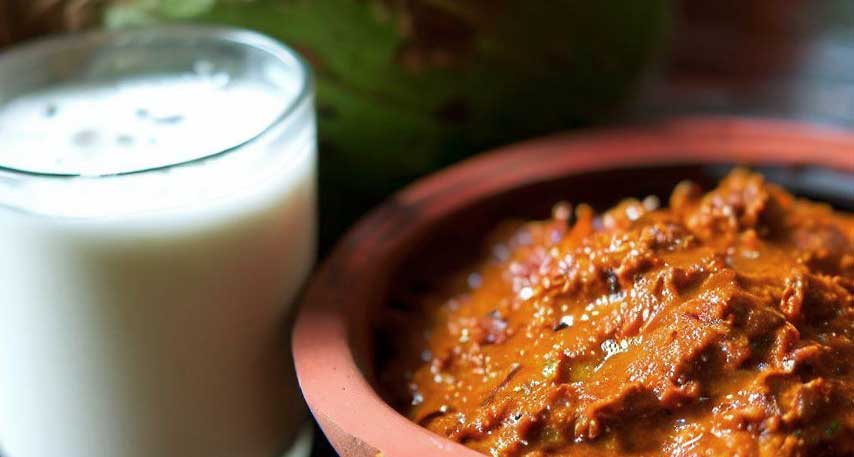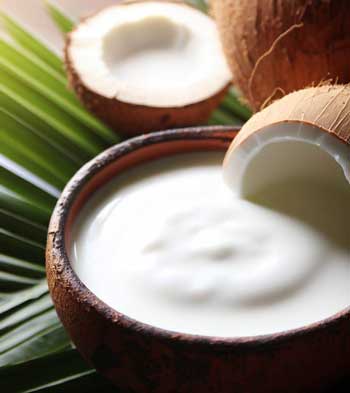In the world of gastronomy, few dishes can rival the mouthwatering allure of a good Thai curry. However, for those navigating the realm of gluten sensitivities and allergies, the question lingers: Is Thai curry gluten free?
Lets journey through the flavors of Thailand, unraveling the gluten conundrum one aromatic bite at a time.
Understanding Gluten Allergies
Before we dive into the world of Thai curry, it’s essential to grasp the impact of gluten allergies. For individuals with celiac disease or gluten sensitivity, eating gluten-rich foods can trigger distressing symptoms.
These can range from uncomfortable digestive issues to broader inflammation affecting the body. This reality makes gluten-conscious diners cautious about their food choices and prompts questions about the gluten content in various cuisines, including Thai food.
Imagine enjoying a meal, only to face discomfort and consequences long after you’ve left the table. This is the challenge for those who must avoid gluten.
Even the tiniest trace of this protein can set off immune reactions, wreaking havoc on the body, especially the digestive system.
Given these challenges, it’s no wonder that those mindful of gluten approach dining experiences carefully. Every meal becomes a puzzle, involving close scrutiny of ingredients and preparation methods.
This attention to detail extends beyond home cooking—it’s a necessity when exploring different cuisines, Thai food included.
Thai cuisine, known for its rich flavors and textures, is a treat for food enthusiasts. But for those avoiding gluten, enjoying Thai food comes with questions. How safe is Thai food for those with gluten sensitivities?
Can you savor the delights of Thai cuisine without accidentally consuming gluten and more specifically, is Thai curry gluten free? These questions are natural for gluten-conscious individuals.
Thai Curries: Are Thai Curries Gluten Free?
Now, let’s explore the captivating world of Thai curries—the pinnacle of this cuisine’s creativity. These dishes blend an orchestra of flavors, from the fiery zest of chilies to the soothing allure of coconut milk.
The question looms: can these intricate blends truly be gluten-free? The answer, often, is a resounding yes.
Thai curries frequently embrace gluten-free sensibilities. Unlike many Western dishes reliant on gluten-containing ingredients, Thai curries typically sidestep these components naturally.
This aspect of Thai cuisine offers a splendid opportunity for those cautious about gluten to savor diverse flavors without compromising dietary restrictions.
The Key Ingredients of a Thai Curry: Curry Paste & Coconut Milk
Thai Curry Pastes
In most cases, traditional Thai curry paste is gluten-free. The core ingredients of Thai curry paste, such as lemongrass, ginger, garlic, and spices, are naturally gluten-free.
This makes the majority of Thai curry pastes safe for individuals who are gluten-conscious or have gluten sensitivities.
However, it’s important to exercise caution when purchasing pre-packaged curry paste, as some commercially available options might include additives or thickeners that could potentially contain gluten.
Always read the label carefully and look for products that explicitly state that they are gluten-free if you have gluten allergies or sensitivities.
If you’re unsure or have concerns about a specific brand or type of curry paste, you can also consider making your own curry paste at home using fresh ingredients to ensure its gluten-free status.
Typical Ingredients Used in Thai Curry Pastes:
| Ingredient | Flavor and Role in Curry Paste | Gluten |
|---|---|---|
| Lemongrass | Adds citrusy aroma and flavor | Gluten-free |
| Galangal | Offers earthy and slightly spicy notes | Gluten-free |
| Garlic | Provides depth and pungency | Gluten-free |
| Shallots | Imparts sweetness and complexity | Gluten-free |
| Dried Red Chilies | Infuses heat and vibrant color | Gluten-free |
| Coriander Seeds | Enhances overall depth of flavor | Gluten-free |
| Cumin Seeds | Adds warm and nutty undertones | Gluten-free |
| Shrimp Paste (Kapi) | Brings umami and depth to the paste | May contain traces |
| Kaffir Lime Zest | Contributes citrusy and herbal brightness | Gluten-free |
| Thai Basil Leaves | Offers an aromatic, fresh element | Gluten-free |
| White Pepper | Adds subtle heat and depth | Gluten-free |
| Salt | Balances flavors and enhances overall taste | Gluten-free |
Thai Coconut Milk:
Coconut milk, a staple in Thai cooking, is extracted from the flesh of mature coconuts. It’s not only a flavor enhancer but also a culinary chameleon that effortlessly transitions between savory and sweet dishes.
Coconut milk is the basis for the majority of Thai curries so it’s important to establish whether it is gluten free or not.
The good news for those concerned about gluten is that pure, unsweetened coconut milk is naturally gluten-free. Unlike wheat-based ingredients that frequently hide in various dishes, coconut milk doesn’t contain gluten in its unadulterated form.
This makes it a valuable ally for individuals with gluten sensitivities or celiac disease.
Take Note:
While the coconut milk itself is gluten-free, it’s essential to be cautious of pre-packaged or processed coconut milk products that might have additives or thickeners containing gluten.
Always scrutinize labels when purchasing coconut milk, especially if you’re highly sensitive to gluten.
Also some Thai restaurants in the west may add thickeners to their curries to reduce the amount of coconut milk needed and thus reducing their costs. For this reason, always ask the the waiter to check with the chef first.
Typical Ingredients Used in Thai Coconut Milk:
| Ingredient | Role in Coconut Milk | Gluten-Free |
|---|---|---|
| Coconut Flesh | The main source of the milk | Gluten-Free |
| Water | Used to extract the coconut milk | Gluten-Free |
| Emulsifiers | Often added to prevent separation | Depends on source (check label) |
| Stabilizers | Maintains consistency and texture | Depends on source (check label) |
| Preservatives | Extends shelf life | Depends on source (check label) |
| Sweeteners | May be added for flavored versions | Usually Gluten-Free |
Please be aware that the status of certain additives (like emulsifiers, stabilizers, and preservatives) can vary depending on the source and manufacturer. Always check the label or contact the manufacturer if you have specific concerns about gluten content.
TLDR: Is Thai Curry Gluten Free?
Yes, the majority of Thai curries are indeed gluten-free.
The natural components like lemongrass, ginger, garlic, and spices are safe for those with gluten sensitivities.
However, if you’re dining out, it’s wise to double-check with the chef or staff at the restaurant, as additives or cross-contamination could be a concern. Stay safe and savor your meal without worries.
Other Popular Thai Dishes That Are Usually Gluten Free
| Category | Gluten-Free Thai Foods |
|---|---|
| Appetizers | Fresh Spring Rolls |
| Chicken Satay | |
| Som Tum (Green Papaya Salad) | |
| Soups | Tom Yum (Spicy Shrimp Soup) |
| Tom Kha Gai (Coconut Chicken Soup) | |
| Gaeng Jued Woon Sen (Clear Glass Noodle Soup) | |
| Curries | Green Curry |
| Red Curry | |
| Panang Curry | |
| Massaman Curry | |
| Noodles & Rice | Pad Thai |
| Pad See Ew | |
| Khao Pad (Fried Rice) | |
| Pad Kee Mao (Drunken Noodles) | |
| Stir-Fries | Pad Pak (Stir-Fried Vegetables) |
| Gai Pad Med Mamuang (Cashew Chicken) | |
| Pad Prik King (Thai Red Curry Stir-Fry) | |
| Seafood | Pla Rad Prik (Crispy Fish with Chili Sauce) |
| Hor Mok Talay (Seafood Curry Custard) | |
| Desserts | Mango Sticky Rice |
| Tub Tim Grob (Water Chestnut in Coconut Milk) | |
| Khanom Chan (Layered Thai Dessert) |





